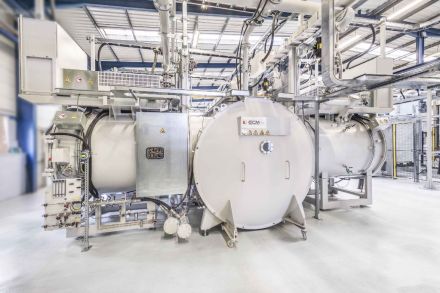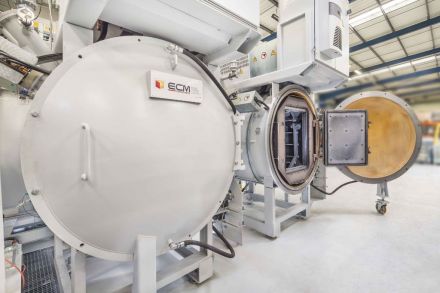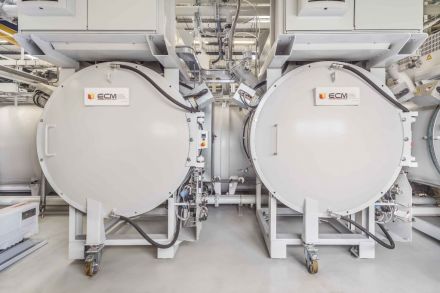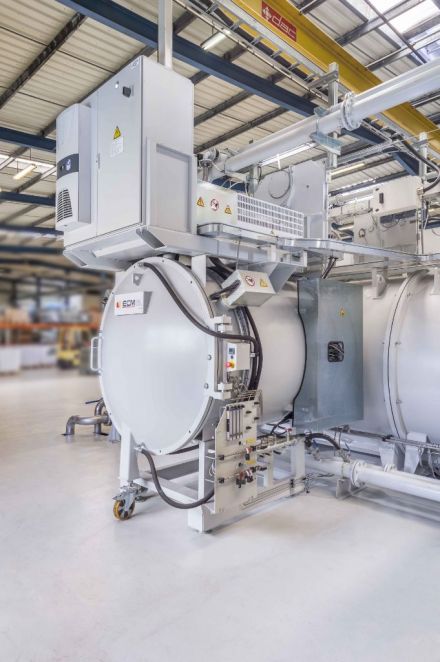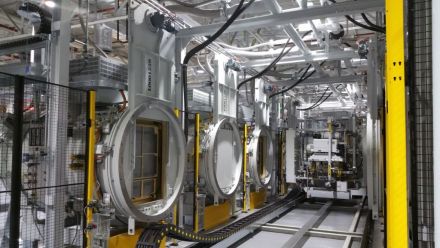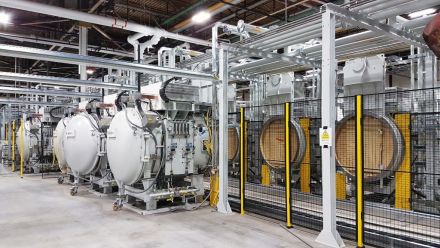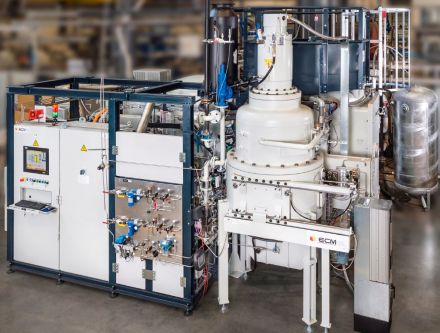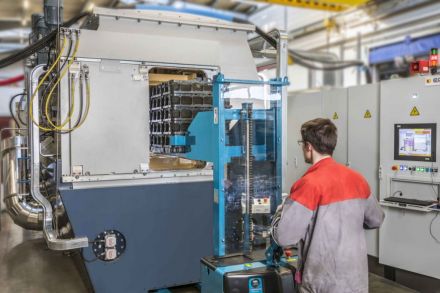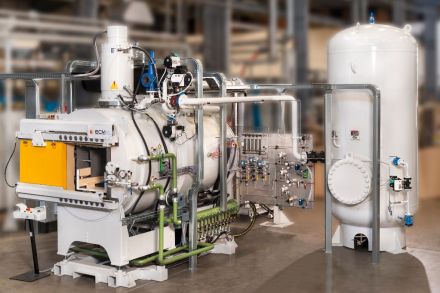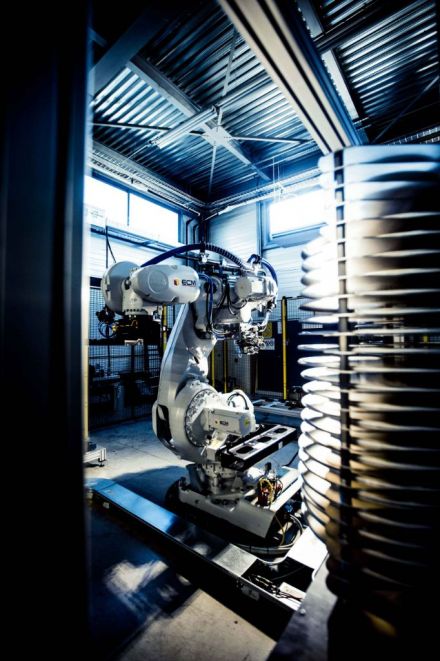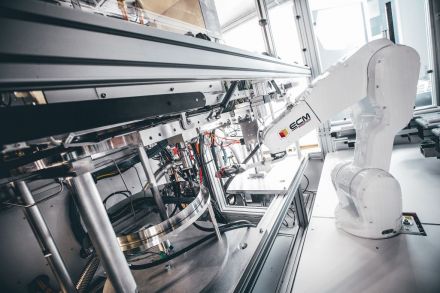ecm
Innovative
technical solutions
About ECM Technologies
ECM Technologies specializes in the design, manufacture and commissioning of heat treatment plants. With a strong heritage, multiple inventions and continuous innovation, the company is now a world leader in vacuum carbonation with an installed base of more than 1300 furnaces worldwide, representing about 300 plants.
Flex
The Flex system is a multi-chamber vacuum carbon furnace designed for flexibility. In fact, the heating cells (ovens) are shipped along a tunnel, making it a modular system that can be expanded according to your production capacity.
This robust, simple yet reliable solution has been proven for more than 30 years and is not limited to vacuum cabling. Depending on the configuration, several processes such as nitriding, sintering or soldering can be carried out. It can also integrate both oil and gas quenching on the same plant, making it ideal for multi-process lines and commercial heat treatment.
In addition to its high flexibility and modularity, the Flex system has a high degree of integration. By using vacuum, it can be integrated into machining lines. No flames are produced, the risk of fire is eliminated and no toxic exhaust gases are released. In addition, the vacuum allows treatments at higher temperatures that shorten cycle times. After all, integration into lines is not limited to localization. The Flex system also has strong robotics and automation potential.
All of the above points enable optimized productivity with shorter cycles, high process reproducibility, optimized logistics, safer processes and higher throughput.
As far as applications are concerned, this system can replace atmospheric pushers or sealed multi-purpose quenching systems and offers several advantages such as: better metallurgical results, a significant reduction in CO2 emissions and higher throughput.
Jumbo
The Jumbo system is a modular vacuum heat treatment system consisting of a transfer shuttle that distributes loads across different furnaces. It is particularly suitable for heavy loads and mass production in automotive, truck or large-volume transmission production. One of the main advantages of the jumbo is the optimized access to all components of the furnace, which allows maintenance work in hidden time during production. It is indeed very convenient to insulate an oven and maintain while the plant remains switched on.
The modular design of the jumbo makes it possible to perform both gas and oil quenching on the same line and to carry out various processes such as vacuum carboning, carbonating, sintering or brazing. In addition, this system is relatively compact in terms of its large-scale production. In fact, the furnaces are arranged opposite each other, which allows an optimized space requirement compared to inline production.
In addition, the jumbo system is in many ways a credible alternative to thrustsystems. First of all, thanks to the use of vacuum treatments at higher temperatures, which lead to better metallurgical results - no intergranular oxidation, higher productivity as cycle times are shortened, optimized energy consumption and a significant reduction in CO2 emissions. In addition, the processes are safer thanks to vacuum and can be integrated into production lines. In fact, no flames are generated and the risk of fire danger is eliminated, which facilitates logistics, as no own building with fireproof doors is needed.
Nano
The nano-system is one of the latest innovations in the coal-burning sector of ECM technologies. It is also a compact system that is perfectly adapted to line integration with robots. It consists of three furnaces arranged on top of each other (but can be easily extended to 6 furnaces) and a gas quenching cell with a maximum pressure of 20 bar.
This compact vacuum heat treatment system is designed for synchronization with machining machines. It has been designed to meet the requirements of intensive production, whether for mass heat treatment applications or for small batches with high throughput. The Nano is also a flexible machine, as each cell is independent and can therefore be controlled independently, allowing multiple processes with the same machine. In fact, vacuum carbonation is just one of the applications that can be carried out in this furnace. Soldering, sintering and hardening are also common applications.
The nano concept can easily replace conventional mesh belt furnaces and brings numerous benefits, such as better overall quality of treatment thanks to the high-pressure gas quenching that minimizes enticity, higher throughput, a sharp reduction in CO2 emissions and optimized energy consumption.
Duo
The Duo series consists of several ovens. These are double-chamber systems: an oven and a quenching cell. The quenching can be done with gas or oil.
Duo furnaces are compact systems that replace sealed quenching furnaces or IQ furnaces for hardening or charring operations.
Thanks to vacuum, duo furnaces are efficient. Heat treatment can be performed at higher temperatures compared to conventional solutions, which increases productivity. In addition, the carbon footprint of these plants is optimized. The electric heating in combination with vacuum makes it possible to dispense with endo gas generators and to consume only the gas needed for carbonation. As a result, energy consumption is limited and CO2 emissions are among the lowest.
In addition, these furnaces are also flexible. In fact, several processes can be tested with duo furnaces, making them ideal products for commercial heat treatments or mechanical workshops where sintered, soldered, hardened or charred can be used.
Thanks to the electric heating and the vacuum, their integration in workshops is very easy. In fact, no flames are produced and the risk of fire is excluded. In addition, duo furnaces can be integrated into existing batch lines using the same peripherals and conveyors.
After all, duo furnaces are efficient, safe and high-quality alternatives to conventional charge furnaces.
Robotic
ECM Robotics is a division of the ECM Group. She has a strong heritage in robotics with experience in various industries. It all started in the semiconductor industry with the precise manipulation of very expensive parts, a process where speed was not a requirement. Then it diversified its activities with the photovoltaic industry, which brought new challenges: high-speed manipulation of very light and fragile parts. Eventually, she discovered the automotive industry, where heavier parts had to be manipulated with industrial cadence.
These experiences make it important to integrate robotics into used or new heat treatment lines and to enhance traditional robotics. As an integrator, ECM Robotics actually designs lines and processes to optimize the use of furnaces and robots. To this end, it uses the latest technologies such as 3D simulations, virtual reality and 3D printing for design and rapid prototyping.
ECM Robotics works with any type of robot of any brand. To enhance the use of robots, it equips them with vision and tracking systems to identify parts and identify potential defects in parts.
Robotics is becoming more and more cooperative and expanding its field of activity from the pure loading and unloading of furnaces.
Finally, ECM Technologies can intervene as the only point of contact for the delivery of furnaces and robots to its customers.


